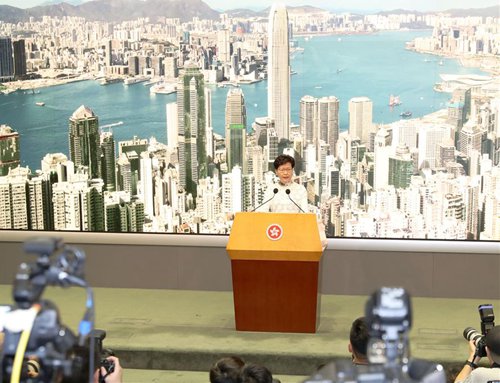HOME >> CHINA
‘American hand’ seen behind HK bill protest
By Zhao Junxi in Hong Kong Source:Global Times Published: 2019/6/17 22:33:40

Hong Kong Special Administrative Region (HKSAR) Chief Executive Carrie Lam announces on June 15, 2019 that the HKSAR government will suspend the amendments to the Fugitive Offenders Ordinance and the Mutual Legal Assistance in Criminal Matters Ordinance until further communication and explanation work is completed.(Photo: Xinhua)
The American hand behind the radical forces in protests against Hong Kong's extradition bill, has launched all-around attacks to obstruct the regional government's legislative process, a Hong Kong alliance convener who supports the bill said.
The alliance's website has been attacked several times, and investigations showed that most attacks were from the US, Kennedy Wong Ying-ho, convener of Safeguard HK, Support the Surrender of Fugitive Offenders Legislation, told the Global Times on Monday.
The alliance, with over 1 million members from 360 Hong Kong organizations, launched an online petition to support the bill in April. More than 930,000 Hong Kong residents have signed in support as of press time.
The US was the first foreign country to comment on the bill after the Hong Kong Special Administrative Region (SAR) government submitted it to the Legislative Council, or LegCo, in March.
The US State Department expressed "grave concern" over the bill and House Speaker Nancy Pelosi vowed to review Hong Kong's special trading privileges if the bill gets passed. US allies, including Britain, Canada and Australia, followed suit.
In the latest move, US Secretary of State Mike Pompeo said on Sunday that US President Donald Trump would raise the issue of Hong Kong human rights with Chinese leaders during the G20 summit in Japan this month.
Those moves come as radical opposition figures had gone to the US several times for help against the extradition bill, Wong said.
"Radical Hong Kong forces have spread leaflets everywhere that distort the bill and incite students who did not read the bill to join their protest," Wong, also a member of the National Committee of the Chinese People's Political Consultative Conference (CPPCC), said.
One such leaflet obtained by Wang said that the bill could lead to unemployment, suppression of religion and cancellation of visa-free policies to other countries.
However, none of those were actually mentioned in the bill.
The SAR government has suspended the exercise to amend the Fugitive Offenders Ordinance and Mutual Legal Assistance in Criminal Matters Ordinance, which aims at plugging loopholes in Hong Kong's overall judicial mechanism.
The amendments, which allow Hong Kong to transfer fugitives to Taiwan and the Chinese mainland, were originally scheduled to be discussed at a LegCo meeting on June 12, but were postponed due to riots around the LegCo building last week.
"Pressure from radical forces did not force the SAR government to suspend deliberations, but rather out of concerns over possible growing confrontation and public safety," Wong noted.
Wong said the frequent US "concerns" over the bill have nothing to do with concern for Hong Kong, and Americans in Hong Kong are only interested in making money.
"Only the SAR and central governments really care for Hong Kong, and Hong Kong residents have to identify who are our people and who are outsiders," Wong said.
Wong believes that the protest will eventually die down, and said he is confident in Hong Kong's future and the SAR government, as the past 30 years have proven that Hong Kong is strong and able of resisting pressure.
Posted in: POLITICS,HK/MACAO/TAIWAN